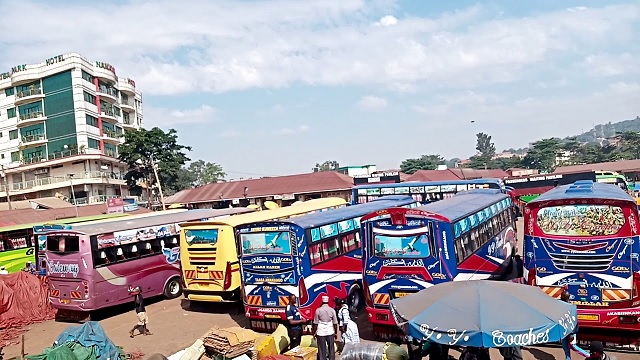
Kampala, Uganda | THE INDEPENDENT | Bus operators have maintained transport fares despite being allowed to carry full capacity of passengers.
On Friday during the end of year address, President Yoweri Kaguta Museveni allowed public transport to resume carrying at full capacity.
Initially, the transporters had doubled the fares after the ministry of health directed transporters to carry half of their licensed capacity to ensure social distancing to minimize Covid-19 transmission.
In Gulu city, all bus operators have maintained transport fares as initially when they were carrying half capacities. They argue that despite the resumption of carrying full passenger capacity, prices of fuel have also gone high.
Some passengers who wanted to board to different destinations and hoped to pay half the initial fares were left stranded after discovering that they were being charged the same amount.
Proscovia Akello, a passenger who wanted to travel to Kampala on Tuesday from Lamogi Ber bus terminal says that she expected to pay 25,000 Shillings but was surprised when Homeland bus like the others asked her to pay 40,000 Shillings.
Edoo Ouma Magero, the booking clerk of Kwezira bus company says that much as they have been allowed to carry the full capacity of passengers, they have maintained their fares due to the rising prices of fuel.
According to Edoo, fares from Gulu city to Kampala have been maintained at Shillings 40,000, Gulu city to Adjumani at 30,000 Shillings, and Gulu city to Kitgum district at Shillings 20,000.
Patrick Bongomin, the manager of Makome bus company also said that they are charging their passengers traveling to Kampala Shillings 35,000 and Gulu to Kitgum district Shillings 25,000, as it was before the reopening of carrying passengers to full capacity.
Bongomin attributed the maintaining of their transport fares to the high cost of fuel which hiked from Shillings 2,600 to 4,600 in the recent months.
According to the prices obtained from the various pump stations in Gulu city, the prices range between Shillings 4,550 and 4,800 Shillings.
In Arua, the bus companies have also maintained the transport fares. The transport fare for buses from Arua to Kampala has remained at between 50,000 Shillings to 60,000.
The companies attribute this to high demand and the rise in fuel prices. Gilbert Apangu, the area manager of KKT bus company says they have maintained the transport fare from Arua to Kampala at 60,000 Shillings due to the high demand as people return to work after the festivities.
At YY coaches, Ismail Juma, the branch manager Arua says despite operating at full capacity, they have maintained the fare at 50,000 from Arua to Kampala and 60,000 from Kampala to Arua due to the hike in fuel prices.
Zawadi bus services that operates between Arua and Adjumani has reduced their fare from 45,000 to 30,000 Shillings. Swaleh Ahmed, the manager says they revised the price after the President allowed buses to carry full capacity.
In Kampala, Gateway bus company maintained its fares. The fares from Kampala to Kabaale are 40,000, Kisoro 50,000, Mbarara 30,000 Shillings. Isma Nsereko, the booking clerk attributed this to the increased fuel prices.
At YY bus company, the fares have increased from 25,000 to 30,000 Shillings at full capacity.
Emmanuel Wabwire ,the manager of YY coaches says that they informed the Ministry of Transport that even at full capacity, they would only increase the fares by 10,000 Shillings in order to meet the fuel prices.
*****
URN
 The Independent Uganda: You get the Truth we Pay the Price
The Independent Uganda: You get the Truth we Pay the Price




This is regrettable because the rates are so high. However, as we request for Government to intervene, it is possible that citizens scale down their travels and leave it to the most critical. Cargo can be sent without the owner escorting it just as mail does. Schools on the other hand should deploy their buses to cause a shift in the rates. However what is most desired especially in the cities and municipalities is for government to fix public transport. really it makes limited sense to drive a seven seater vehicle just to park it on arrival at the work place and drive off at 5pm as you complain about fuel prices.